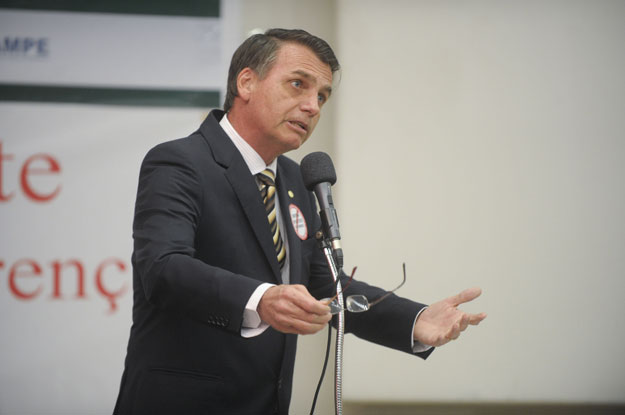This article has been updated. A correction is also appended below.
When Brazilian Congressman Jair Bolsonaro on Sunday dedicated his pro-impeachment vote to the military colonel who allegedly oversaw the torture of President Dilma Rousseff, and then reportedly hurled a string of anti-gay slurs at another politician, it was hardly the most shocking episode of his political career.
Over the years, Bolsonaro has said he would prefer his son die than come out as gay, compared same-sex marriage to pedophilia, attributed homosexuality to drug use, and encouraged the physical abuse of children thought to be gay. By comparison, when he appeared last month in the Viceland documentary series “Gaycation,” he acted relatively kind in telling gay Hollywood actor Ellen Page that she was “very pretty” in response to her asking, “Do you think I should have been beaten as a child, to not be gay now?”
While extreme, Bolsonaro reflects the growing anti-gay and socially conservative political forces in Brazil that pose a rising threat to the lesbian, gay, bisexual and transgender (LGBT) community. Brazil, which in recent years has become a regional leader on LGBT inclusion, could be at risk of stepping backward if figures such as Bolsonaro continue to gain influence and popularity; some polls show Bolsonaro as high as fourth place among possible candidates in the 2018 presidential election.
Among those concerned are Jean Wyllys, the congressman on the receiving end of Bolsonaro’s anti-gay epithets Sunday during the impeachment vote. Days before the exchange – during which Wyllys also spat at Bolsonaro – Wyllys told AQ in an email interview that he fears what Brazil’s next government might look like.
“I don’t know what they can do,” said Wyllys, who is Brazil’s only openly gay congressman, “but I can say with certainty that it won’t be good for us.”
By many counts, life for Brazil’s LGBT community improved during the government of President Rousseff and her Workers’ Party (PT). Positive representation of gays in the media has risen, and courts have ruled in favor of civil unions and same-sex adoption.
Yet homophobia is still a persistent problem. Nearly half of all reported anti-LGBT violence in the world occurs in Brazil, where about one person is killed every day in a homophobic or transphobic attack. Many fear a Bolsonaro presidency could make matters worse.
“I’m really worried,” Gabriël Coutinho, a photographer and hotel receptionist from Rio de Janeiro, told AQ. “We’re not just talking about bigotry against gay people, but against black people and women too. If Bolsonaro gets elected, this kind of hatred will be seen as acceptable.”
Despite – or because of – his controversial remarks, Bolsonaro’s popularity is surging. On Facebook, he boasts more than 2.8 million likes – a half-million more than former President Luiz Inácio Lula da Silva. At anti-government protests this year, crowds have flocked to him like a celebrity, eager to get a selfie with someone who once delivered a sexist tirade against a congresswoman “not worthy of being raped.”
According to The Guardian, when Rousseff was asked Tuesday to respond to Bolsonaro’s controversial remarks during Sunday’s impeachment proceedings, she said it was “regrettable that this moment in Brazil has opened a door to intolerance, hate and to this kind of statement.” She added that she had indeed met the man he referred to, and that he was “one of the biggest torturers in Brazil and was accused of torture and killing.”
Among potential presidential candidates for the 2018 election, Bolsonaro is currently polling fourth, according to a Datafolha survey conducted April 7 and 8. While his support is relatively low, at 8 percent of intended votes, that is twice as high as it was in December. Bolsonaro’s fortunes could rise further if Lula and opposition leader Aécio Neves, who are polling among the top three prospective candidates, are further implicated in Brazil’s ongoing corruption scandal.
Bolsonaro owes some popularity to his inclusion in Brazil’s “bullet, beef and Bible” coalition, which tends to support socially conservative political movements like his Social Christian Party (PSC). An evangelical, Bolsonaro also attracts voters from the growing evangelical bloc, which demonstrated its clout in 2014 by electing Brazil’s most conservative Congress since 1964, with Bolsonaro receiving the most votes in Rio de Janeiro state and nearly quadrupling his support from 2010. He draws still more support from voters attracted to his hardline stance on crime and drugs, and those who identify with – or are at least untroubled by – his harsh views on LGBT rights.
Ítalo Damasceno, an LGBT rights activist, lawyer and columnist for Brasília’s Metropoles news site, told AQ that Bolsonaro’s anti-gay views are indeed among the most extreme in Congress, but that he’s also no outlier. “It’s currently not politically attractive to be in favor of gay rights,” Damasceno said. “The few politicians in favor of gay rights don’t have the political might as those who are against the LGBT community.”
Indeed, Bolsonaro isn’t the only politician drawing concern from LGBT Brazilians. Marina Silva, who is also expected to be a top contender in the next presidential election, lost support from many gays during the 2014 campaign when she reversed her progressive stances on a number of LGBT issues amid pressure from evangelical groups. Meanwhile, Lower House President Eduardo Cunha, who is currently third in line to the presidency, has said Brazil is “under attack” by gays. He introduced legislation last year that sought to annul the 2013 judicial ruling in favor of civil unions.
Even if Rousseff survives impeachment, another scenario could see Brazil’s electoral court boot Rousseff and Temer from office and allow voters to choose a new president. Bolsonaro would likely be in the running.
As it becomes more evident that Brazil’s worst recession in 80 years isn’t going anywhere, many LGBT citizens will likely be focused more on making ends meet than on politics. But Bolsonaro and other far-right politicians appear increasingly ready to jump on the opportunity to use their demands for equality – and those of other minorities – as a scapegoat for the country’s growing list of problems.
“As the rights of one group advance,” noted Damasceno, “there will always be someone trying to gain popularity by using their gains as a threat to others.”
Correction: An earlier version of this story incorrectly cited Carlos Ustra as the man who tortured Dilma Rousseff. Ustra oversaw the intelligence services accused of torturing Rousseff while she was imprisoned, but has not been directly implicated in her torture.
—
O’Boyle is an editor of Americas Quarterly and policy associate at Americas Society/Council of the Americas









